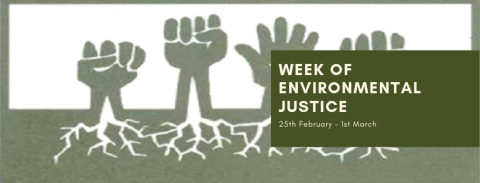
Human RightS Initiative and Sustainable CEU are pleased to invite you to a series of events as part of the Week of Environmental Justice: Focus on Electronics Production, Consumption and Disposal. During the last week in February keep a look out for our events and communication related to the event series.
Facebook event :
25th February-8th March: Cellphones for Chimpanzees Campaign
Nador 11, 13, 15
HRSI in collaboration with the NGO Jane Goodall Institute invites you to an exhibition and used cellphone and electronics collection campaign that aims to reuse and recycle still valuable material from old electronics in order to help disrupt the demand for freshly mined material resources.
We encourage you to place any used cell phones, tablets or laptop computers which you are willing to part ways with into collection bins located in the hallway between N11 and Nador 13. The items will be recycled or reused in partnership with the Jane Goodall Institute’s Cellphones for Chimpanzees Campaign.
In the last two decades, a civil war has erupted in the Democratic Republic of Congo, funded in large by the nation’s mineral abundance in tantalum, tungsten, tin and gold, all found in excess within DRC’s borders, all of which are required for nearly all popular electronic devices. As a result, global industry has created an insatiable demand for these minerals, which are being extracted by armed militia in DRC at any and all cost, including the rape, torture, slaughter and enslavement of innocent peoples for leverage in the mines. The money raised from recycling and material collection from these phones will be directly channeled towards ecosystem conservation in Congo. Learn more about the campaign here. If you have any other queries please write to hrsi@ceu.edu
_________________________________________________________________
25th February-1st March: Exhibition: Following the Senseless Trail: Tracing the Environmental and Human Rights Impacts of "Smart" Electronics
Nador 11-13 Passageway
Have you upgraded your cellphone or purchased a new tablet or notebook lately? Have you ever wondered just what went into making these complex electronic devices which now dictate daily life? Join us for an exhibition which will help tell the story of the human rights and environmental consequences of electronics consumption, from material extract to disposal. Join us if you are curious to know more about the true costs of electronics usage, why your devices seem to become obsolete after a short time, and why it’s nearly impossible to fix devices on your own and the bigger picture impacts of mass electronics consumption.
_________________________________________________________________
26th February-Round table discussion on The Impacts of Electronics Consumption, Production and Disposal (FB event)
Nador 11, 004, 17:30-19:00
We invite you to discussion which will focus on the social and environmental impacts of electronics production, consumption and disposal. In the last decade our reliance on electronic devices in everyday life has intensified, while at the same time the further electrification of the energy sector has been touted as step in the right direction towards climate mitigation. In the background of increasing electronics dependence lies the continuous and destructive search for rare earth metals found underground mostly in Africa, destructive mining practices and dangerous working conditions in the search of metals, and complex problems associated with handling hazardous electronic materials at the end of their usage life.
With a panel of invited experts, we will explore the consequences of our obsession with electronic devices, larger systematic and policy issues, and what can be done to discourage human rights violations and environmental destruction associated with electronics production and usage. The discussion will be moderated by Logan Strenchock (Sustainable CEU)
_________________________________________________________________
28th February- Movie Screening: Complicit (2017)* (FB event)
Nador 15 103, 18:00-20:00
Complicit is a heart-breaking, eyes-opening and well-crafted documentary showcased at Verzio 2018. It follows the journey of Chinese factory migrant worker-turned-activist Yi Yeting, who takes his fight against some of the world’s largest electronic industry brands including Apple and Samsung from his hospital bed to the international stage. The movie is a wake-up call to anyone who has been dormant to the effect of our personal choices in other global corners, occupational diseases and exploitation of labor in China so far.
*THIS EVENT HAS LIMITED CAPACITY. PLEASE EMAIL HRSI@CEU.EDU TO RESERVE YOUR SEAT.
What is environmental justice?
The environmental justice movement is an ever-growing movement that in its simplest form highlights that vulnerable communities face a disproportionate burden of environmental problems. It focusses on issues such as health, access to safe drinking water, and housing that are at the heart of treaties and laws focused on human rights. Thus, at its core, environmental justice is about the intersection of human rights, the environment and sustainable development. Previously isolated areas are increasingly connected with distant places for ecosystem services, labor migration, tourism to name a few. To understand global sustainability through the lens of environmental justice is to understand the tradeoffs between local and global sustainability and the need for multi-level management and solutions. This requires different avenues of stakeholder engagement and awareness to possible linkages of the issues.